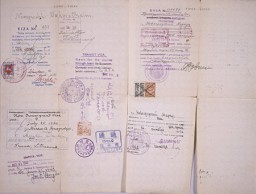You searched for: 外貿推廣seo立擇火3星頂尖【TG飞机:@bapingseo】波兰灰产引流【TG电报:@bapingseo】漢川谷歌優化【Telegram:@bapingseo】猫购彩大厅万豪会员登录入口亚博体育app在哪下载注册免费领取28元?dS3k13/xW0tKZ.html
<< Previous | Displaying results 401-410 of 445 for "外貿推廣seo立擇火3星頂尖【TG飞机:@bapingseo】波兰灰产引流【TG电报:@bapingseo】漢川谷歌優化【Telegram:@bapingseo】猫购彩大厅万豪会员登录入口亚博体育app在哪下载注册免费领取28元?dS3k13/xW0tKZ.html" | Next >>
-
Katzenberger Case, March 13, 1942
ArticleThe Nuremberg Special Court ruled on the Katzenberger Race Defilement Case in 1942. Learn more about the outcome and impact of the case.
-
Gerd Jacob Zwienicki
ID CardGerd was the eldest of four children. His father, Josef, had left Ukraine in 1913 and opened a bicycle sales and repair shop in Bremen. His mother, Selma, was descended from a distinguished Jewish family and had been a kindergarten teacher and a bookkeeper for a large firm. As a child, Gerd experienced the hardships of the Depression and witnessed the violent street fights between the Nazis and their political opponents, the Communists and Socialists. 1933–39: When the Nazis came to power in 1933, Gerd…
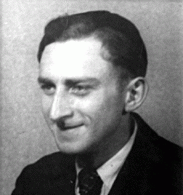
-
Vladka (Fagele) Peltel Meed describes smuggling a description of the Treblinka camp to underground leaders on the "Aryan" side of Warsaw
Oral HistoryVladka belonged to the Zukunft youth movement of the Bund (the Jewish Socialist party). She was active in the Warsaw ghetto underground as a member of the Jewish Fighting Organization (ZOB). In December 1942, she was smuggled out to the Aryan, Polish side of Warsaw to try to obtain arms and to find hiding places for children and adults. She became an active courier for the Jewish underground and for Jews in camps, forests, and other ghettos.
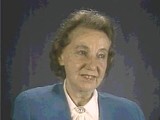
-
Norbert I. Swislocki describes leaving Warsaw with his mother upon the outbreak of war
Oral HistoryNorbert was 3 years old when Germany invaded Poland in September 1939. He and his mother were in Warsaw; his father had been drafted into the Polish army and later ended up in Vilna. Norbert and his mother set out to join him and the family was reunited after a few months. After the family had been in Vilna for about a year, Norbert's father was able to obtain visas for Curacao in the Dutch West Indies and visas for transit through Japan. Norbert and his parents left Vilna in January 1941, and arrived in…
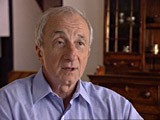
-
Norbert Wollheim describes his liberation at Schwerin, in northeast Germany, in May 1945
Oral HistoryNorbert studied law and was a social worker in Berlin. He worked on the Kindertransport (Children's Transport) program, arranging to send Jewish children from Europe to Great Britain. His parents, who also lived in Berlin, were deported in December 1942. Norbert, his wife, and their child were deported to Auschwitz in March 1943. He was separated from his wife and child, and sent to the Buna works near Auschwitz III (Monowitz) for forced labor. Norbert survived the Auschwitz camp, and was liberated by US…
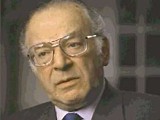
-
Norbert I. Swislocki describes fleeing from Warsaw with his mother
Oral HistoryNorbert was 3 years old when Germany invaded Poland in September 1939. He and his mother were in Warsaw; his father had been drafted into the Polish army and later ended up in Vilna. Norbert and his mother set out to join him and the family was reunited after a few months. After the family had been in Vilna for about a year, Norbert's father was able to obtain visas for Curacao in the Dutch West Indies and visas for transit through Japan. Norbert and his parents left Vilna in January 1941, and arrived in…
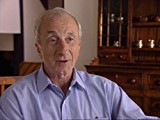
-
Abraham Bomba describes the Treblinka gas chambers
Oral HistoryExcerpt from Holocaust survivor Abraham Bomba's oral history testimony describing gas chambers at the Treblinka killing center.
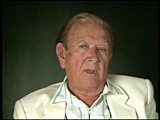
-
Edward Lessing describes wearing the compulsory Jewish badge.
Oral HistoryEdward was born to a Jewish family in The Hague. In 1929, the family moved to the United States. Because his father had difficulty finding employment, Edward and his family returned to the Netherlands in 1932. They were living in the town of Delft and running a small clothing store when war broke out. Germany invaded the Netherlands in May 1940. Anti-Jewish decrees were instituted, increasing in severity to the point that Jews could no longer own businesses and were forced to wear a yellow badge after May…
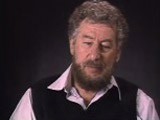
-
Lachwa
ArticleThe Lachwa ghetto was established in Łachwa, Poland in April, 1942. Learn more about the ghetto and uprising.
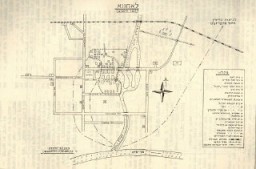
-
Flight and Rescue
ArticleExplore the story of over 2,000 Polish Jewish refugees who fled east to escape war-torn Europe. They sought safety in such distant places as China and Japan.
